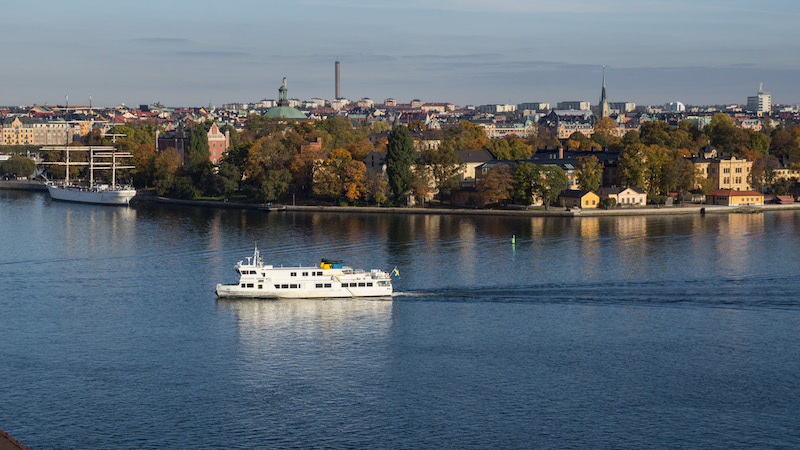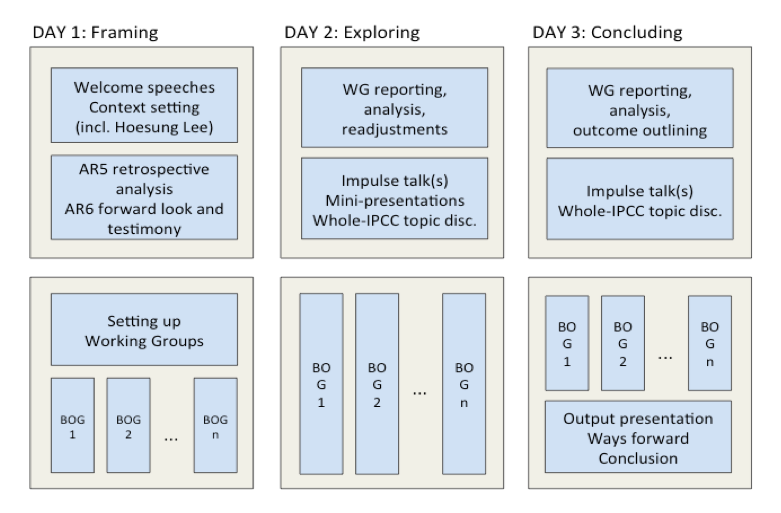Future Earth-PROVIA-IPCC risks and solutions workshop

Online participation in the workshop is open to any interested individuals through a live stream. To watch plenary sessions during all three days of the workshop or to submit questions and comments, follow these links:
29 August: https://youtu.be/JgOrSC5ZokE
30 August: https://youtu.be/g2KuOgp1nnA
31 August: https://youtu.be/EdCBbBAqJqw
Or join the discussion on Twitter using the hashtag #ipccstockholm
Summary
The Paris Agreement in December 2015 demands an urgent response from the research community. An immediate priority is greater international coordination of climate research in support of the Intergovernmental Panel on Climate Change’s Sixth Assessment Report (IPCC AR6) to help inform future development pathways.
On 29-31 August, the IPCC, Future Earth and PROVIA (The Global Programme of Research on Climate Change Vulnerability, Impacts and Adaptation) will hold a scientific workshop to identify research gaps relating to integrated research on risk and solutions in support of IPCC AR6 and development pathways for a resilient future.
The workshop, jointly hosted by the Future Earth Hub in Sweden and the Stockholm Resilience Centre with financial support from the IPCC, MISTRA and Stockholm Business Region, will bring together 70 scientists and stakeholders.
See the full framing document for this workshop here.
Workshop goals
The workshop is designed to further support the research and coordination needed for AR6, and to inform the assessment development, by bringing together experts from research and society across the areas of planetary and regional climate risks (Working Goup I), societal and ecological risks (Working Group II) and abatement of risks (Working Group III) to discuss the major scientific issues associated with integrative risk management and sustainable solutions to the climate challenge. It will explore the lessons learnt from AR5 (see links below), for example, it will identify major gaps in understanding related to the climate system, adaptation, mitigation and vulnerability and examine the strategic research approaches to addressing these issues in the next 3-5 years. It will also explore how the IPCC process can improve the assessment process in support of these aims.
The workshop will complement the 2014 IPCC-World Climate Research Programme (WCRP) workshop (Final Report published 29 January) focusing on lessons learnt relating to AR5 with a particular emphasis on Working Group I, the physical basis of climate change. WCRP is providing additional financial support for this workshop.
Outcomes
Workshop participants will produce a report for IPCC and a peer-reviewed paper to describe the research challenges, and opportunities related to integrated risks to fill high-priority knowledge gaps for climate-resilient and sustainable solutions. The report and paper will outline how Future Earth and PROVIA can help support research coordination internationally to address these gaps. Furthermore the workshop aims to provide recommendations for the preparation and production of future IPCC assessments.
IPCC AR5 knowledge and data gaps
The IPCC Fifth Assessment Report outlined a number of research and data gaps and outstanding issues in climate research.
- IPCC AR5 WGI: Key Uncertainties (p114)
- IPCC AR5 WGII Part A: Research and Data Gaps (p258)
- IPCC AR5 WGII Part B: Research and Data Gaps (p1183 and 1184)
- IPCC AR5 WGIII: Gaps in Knowledge and Data (detailed at end of each chapter)
Programme
Prof. Hoesung Lee, Chair of the IPCC, will deliver an introductory keynote speech during the opening session.
See the final workshop programme here.
Dedicated Task Groups will address the following five questions:
- GAPS: knowledge gaps on climate-resilient and sustainable solutions to support AR6;
- SOLUTIONS: catalyzing research, tools, methods, and learning mechanisms to inform development and deployment of sustainable solutions;
- REGIONAL: sharing information on risks and solution strategies across local to global scales;
- SCENARIOS: facilitating consistent use of climate and development scenarios across the IPCC WGs.
- RISKS: consistent and effective characterization and visualization of risks and sustainable solutions across IPCC Working Groups.

Participation
Participants in the workshop will be highly qualified scientists with a good experience in or knowledge of the IPCC process, keenly interested early-career researchers, as well as stakeholder experts, user groups and government representatives. The workshop aims to cover a broad range of academic disciplines and expertise from all regions of the world.
Open Applications
Applications to attend this workshop in-person are now closed. A full list of participants will be released shortly.
Committees
SCIENTIFIC COMMITTEE:
- Shobhakar DHAKAL, Asian Institute of Technology, Thailand
- Kristie EBI, School of Public Health, University of Washington, USA (co-chair)
- Corinne LE QUÉRÉ, Tyndall Centre, University of East Anglia, UK
- Ramon PICHS-MADRUGA, IPCC WGIII Vice-Chair, Centre for World Economy Studies, University of Havana, Cuba
- Debra ROBERTS, IPCC WGII Co-Chair, Environmental Planning and Climate Protection Department, EThekwini Municipality, Durban, South Africa
- Johan ROCKSTRÖM, Stockholm Resilience Centre, Sweden (co-chair)
- Jean-François SOUSSANA, National Institute for Agricultural Research (INRA), France
- Carolina VERA, IPCC WGI Vice-Chair, Center for Atmosphere and Ocean Sciences, University of Buenos Aires, Argentina
Secretariat support and liaisons to Organizing Committee:
Thorster KIEFER and Claire WEILL, Future Earth Secretariat (France)
ORGANISING COMMITTEE:
- Wendy BROADGATE, Future Earth Secretariat (Sweden) (chair)
- Thorsten KIEFER, Future Earth Secretariat (France)
- Rebecca OLIVER, Future Earth Secretariat (Sweden)
- Mxolisi SHONGWE, IPCC Secretariat
- Melinda TIGNOR, IPCC WGII Technical Support Unit
- Claire WEILL, Future Earth Secretariat (France)
Contact
For more information, please email the team at workshop@futureearth.org
Practical information
The workshop will be held at the Royal Swedish Academy of Sciences:
Lilla Frescativägen 4A
SE-114 18 Stockholm
Subway red line towards Mörby Centrum, get off at station Universitetet.
Bus 50 from Fridhemsplan, Centralen or Odenplan to station Universitetet.
You can see a map of the location here.
AUTHOR
Future Earth Staff MemberSHARE WITH YOUR NETWORK
RELATED POSTS
Apply for the 2024 Pathways Autumn School: Transformative Research for a Just World and a Habitable Planet
Sustainability Research and Innovation Congress 2024
2022 ECRs in Sustainability Science Webinar: Technology for Cooking-oil Fume Purification